
 |
|
|
|
Nearly every radical trend in American filmmaking of the '70s can be seen ten years earlier in Japan, where directors embraced subject matter here shunted to the depths of exploitation filmmaking -- stories of teen violence, sordid crime and sex as a normal (and abnormal) facet of every aspect of life. The newer Japanese filmmakers kept apace of international trends and were quick to show the influence of the French New Wave. For its 28th series box of themed films, Eclipse has gathered five manic, wildly expressive movies by Koreyoshi Kurahara, who made films in several genres but is best known for his deliriously frenetic pictures about reckless juvenile delinquents and lovers in the throes of emotional crises. The Warped World of Koreyoshi Kurahara isn't considered part of the Japanese New Wave represented by Seijun Suzuki, Nagisa Oshima, Hiroshi Teshigahara and Shohei Imamura, but instead finds its own highly commercial but individualist path. 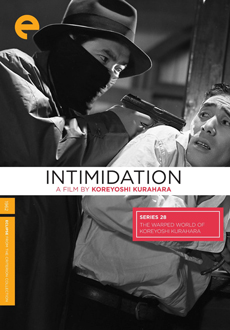
Kurahara's early pictures include a number of tense crime thrillers and movies about business intrigues. His Intimidation (Aru Kyouhaku) is a compact "office noir" about desperate characters. A lowly bank clerk (frequent Kurosawa player Akira Nishimura) has plenty of reasons to resent the manager (Nobuo Kaneko), once a friend and now a fraud recently promoted to the front office. The manager rose to power by stealing the clerk's sweetheart (the bank president's daughter) and has further humiliated him by seducing and abandoning his sister, who is now a prostitute. A mysterious blackmailer surfaces and demands that the manager rob his own bank, or face the exposure of his illegal business dealings. The manager decides to go through with the crime -- in a way that will direct the blame toward the clerk. Showing a keen understanding of the claustrophobic appeal of noir thrillers, Kurahara stages his tale in cramped rooms, the bank vault at 4 a.m. and a gloomy cliff-side rendezvous. It's a story of crooked business ethics and the way relationships change: the manager treats the clerk like a servant, but still insists on calling him a friend. The multi-twist ending leads to a particularly chilling ironic finish. 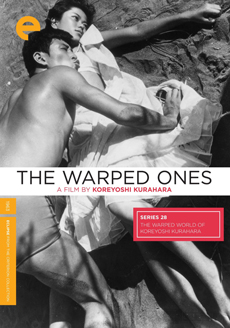
Koreyoshi Kurahara's first film jobs were in a new youth genre called "Sun Tribe Films", about spoiled, ethics-challenged rich kids getting into trouble. Kurahara found his most extreme mode of expression with The Warped Ones (Kyonetsu no kisetsu, a picture that would have shocked the Hollywood of 1960 to its very foundations. Pickpocket and car thief Akira (Tamio Kawachi) is a hyperactive, violent rebel comparable to Alex of Stanley Kubrick's A Clockwork Orange. Akira takes his vengeance on a reporter who turned him in by raping the reporter's artist girlfriend, Fumiko (Noriko Matsumoto). Things become complicated when the artist becomes obsessed with her attacker. Akira ignores Fumiko's emotional appeals but regularly breaks into her house. Meanwhile, Akira's roommate Masaru (Eiji Go) aspires to join a Yakuza gang, which he thinks will lead to riches and the chance to marry his girlfriend, the utterly amoral prostitute Yuki (Yukio Chishiro). Both women become pregnant. Disdaining the entire world around him, Akira bounds through streets hooting like a monkey and making mad faces at anybody he meets. He happens to barge in on a group of Fumiko's artist associates, who praise his rebellious attitude and anarchic beauty. Atypically, Akira retreats. The director's camera sometimes seems detached from the law of gravity, as it swoops up to the blazing sky (a Kurahara motif). Like Anthony Burgess's Alex the Droog, Akira betrays a human sensitivity only when in the thrall of his beloved jazz, which he calls "black music". He explains at one point that "the whites stole it from the blacks, and we (the Japanese) imitate the whites. That makes us the worst of all." Akira is provoked to kill only when the desperate Fumiko yanks the phonograph needle from a jazz record to get his attention. Akira's black American soldier friend Gil (Chico Roland) stays Akira from slashing her with a broken bottle. The final scene is a terrifying collision of anarchic frozen frames. Kurahara's camera catches Akira seemingly laughing at God, declaring his total rejection of human values. 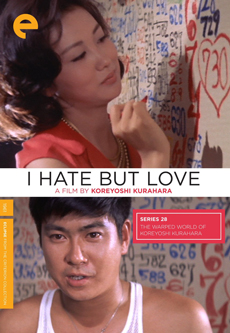
As a consistently successful director, Kurahara was in an enviable position at the trendy Nikkatsu Studios. His ostensible star vehicle I Hate but Love (Nikui an-chikusho is a teaming of Japan's leading heart-throb romantic couple of 1962, Yujiro Ishihara and Ruriko Asaoka. The result is a film of surprising emotional depth. Ishihara plays Daisaku, a character something like himself, a "media sensation" who began writing TV jingles and is now a movie star and television host. His sweetheart and manager of two years Noriko (Asaoka) arranges his busy schedule while awaiting a marriage proposal. They're honoring an early pledge to keep sex out of the picture, but that vow is wearing thin. Then Daisaku encounters a TV guest who defines love in an entirely different way: she has never met her lover. He is a charity doctor working far to the south, and she needs someone to drive a badly needed jeep 900 miles to his underfunded, isolated clinic. Daisaku is moved by her sincerity. He volunteers to do the driving, ignoring Noriko's protests and various lawsuits from his employers. The second part of the film is an extended road trip, with Noriko chasing Daisaku in his silver Jaguar. Against his will, his associates turn his errand to discover the nature of "true love" into a publicity stunt. Excellent color cinematography (the transfer really sparkles) makes I Hate but Love an impressive road odyssey. The feuding lovers meet and separate on the long drive. Kurahara's direction isn't as frantic as with his previous film, but it's sufficiently eccentric to guarantee the drama's unpredictability. The attractive Daisaku and Noriko make a fine romantic couple. Incidentally, they confirm the notion that imperfect teeth are actually a plus factor for Japanese film idols of this era. 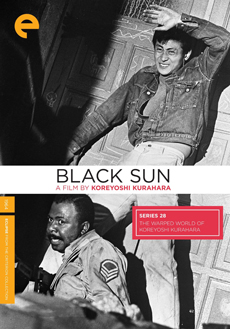
1964's Black Sun (Kuroi taiyo) is a strange buddy film that resembles a twisted hybrid of Stanley Kramer's Civil Rights lecture The Defiant Ones and Kurahara's The Warped Ones. Tamio Kawachi returns as a jazz-loving sneak thief and frequents the same be-bop bar papered with images of black American jazz greats. This time he's called Mei, though, and he's a much more sentimentalized character. Mei loves his dog (named Thelonius Monk) and only bothers people that show insufficient respect for his precious Max Roach albums. Mei encounters Gil (black actor Chico Roland, also from The Warped Ones), who has morphed into a crazed, wounded American GI on the lam from the MPs for killing another soldier. The film's tone is all over the place. A realistic first act goes haywire when the odd couple escapes the cops by pretending to be street musicians -- Mei wears blackface and Gil whiteface as they cruise downtown Tokyo in a beat-up convertible. The prostitute Yuki (Yukio Chishiro) returns, but Mei is unable to employ her services as a translator. The goofy outlaw and the black gaijin spend most of the film at each other's throats, unable to properly communicate. Gil carries a (ludicrously oversized) submachine gun and is in constant pain from his leg wound. We can't readily discern Kurahara's goals. The jazz fans force the uncomprehending Gil to dance around like a minstrel performer, after which Kurahara hits us with a still montage of marching Americans and Southern lynchings complete with screaming victims. Catching us by surprise is the revelation that Mei's love of American jazz is not a bridge to racial understanding, but a barrier. Gil is not musical and feels as oppressed by the jazzman stereotype as he is by the Army and the police. The final manhunt and absurd finish are impressively staged and filmed, but Black Sun is the first film in the collection that does not seem a complete success. 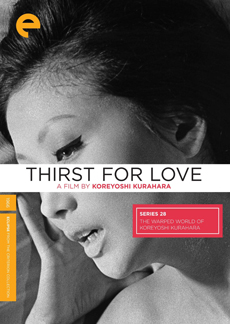
1966's Thirst for Love (Ai no kawaki) sees the versatile Kurahara fashioning a carefully judged adaptation of a novel by the legendary Yukio Mishima. A dysfunctional Japanese family is analyzed in terms familiar to fans of Tennessee Williams: unorthodox relationships and sexual obsessions run wild. Paterfamilias "Father" (Nobuo Nakamura) is a self-made man retired to a suburban estate near Osaka. Living with him are his underemployed son, his widowed daughter and her two children, and Etsuko (big star Ruriko Asaoka of I Hate But Love). The widow of another son, Etsuko has become Father's mistress, a relationship that they do not hide. But Etsuko is drawn to the young gardener Saburo (Tetsuo Ishidate), and is prone to sensual delusions, fainting spells and other fantasies. Etsuko was devoted to her husband but shortly before his death discovered that he was unfaithful; she has gravitated toward Father by default and lives in a state of sexual panic, desperate for her "real life" to finally begin. When Sabuko makes the young, immature maid Miyo (Chitose Kurenai) pregnant, Etsuko's ruthless side asserts itself, manipulating the younger people for her own purposes. But the outwardly servile Sabuko isn't as gutless as he looks. Thirst for Love shimmers with sensual effects achieved through precise visuals; director Kurahara's pans to the sky, so erratic in the other films, are here quite restrained. Ruriko Asaoka's performance is riveting. (She also possesses an incredibly sensual upper lip.) Etsuko is a woman of intense, but elegant, sexuality. She is also a destructive force, as she doesn't mind distressing her relatives or abusing her superior position over Sabuko. We see Etsuko dig her fingers into Sabuko's back, and she later regards the drops of blood on her nails. The B&W film has soft, delicate images, with especially tactile close-ups. The director interrupts the flow several times for brief color shots lit by blazing orange sunsets. He also employs other odd techniques. Voiceovers and inter-titles intercede to tell us a character's feelings, or to restate unheard dialogue. One important dialogue exchange suddenly reverts to silent-movie technique, with twin columns of Japanese text popping on and off the screen. As might be expected of a story by Yukio Mishima, the symbolic conclusion is a violent tragedy. Yet Thirst for Love communicates honest insights about its characters - it is a fine traditional drama embellished by Kurahara's radical touches. Once again Eclipse introduces an impressive slate of films by a remarkable director nearly unknown in America. The Warped World of Koreyoshi Kurahara packs five features in separate slim cases. Each is given an excellent liner appraisal by contributing writer Chuck Stephens. Stephens tells us that the prolific Kurahara was both a creative and a commercial powerhouse, directing many popular star vehicles for Japanese screen idols. I remember his 1983 Antarctica getting a solid American run. Its story of a pair of abandoned sled dogs running hundreds of miles through the snow was, we are told, the most successful Japanese movie until Princess Mononoke. The transfers of these Nikkatsu pictures are all flawless, with the color on I Hate but Love looking particularly good. These are wild, wild movies made at a time when American movies were nowhere near as liberated or adventurous. Frankly, most films now aren't as adventurous or as exciting.
On a scale of Excellent, Good, Fair, and Poor,
Reviews on the Savant main site have additional credits information and are often updated and annotated with reader input and graphics. Also, don't forget the 2011 Savant Wish List. T'was Ever Thus.
Review Staff | About DVD Talk | Newsletter Subscribe | Join DVD Talk Forum |
| ||||||||||||||||||